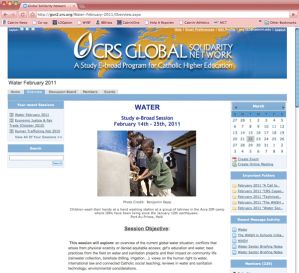
Catholic Relief Services held a Global Solidarity Network on water security that had mixed reviews from college faculty and students alike who took part in the two-week event.
Held in online discussions as well as live web conference sessions, the GSN had presenters representing CRS and spoke about water and the need for water security worldwide while students and faculty could interact by asking questions and receiving answers in real time over the webcast.
Dr. Eric Malm, assistant economics and business administration professor, said his environmental economics class approached the water security GSN in the context of water pollution and how contaminated water can endanger water security.
“In a broad sense, the fundamental right to have clean drinking water was the focus of our session in the GSN,” Malm said. “Water security is a domestic issue as well as an international issue that I am glad was addressed.”
Malm said a local example of an issue of water security would be the drilling for natural gas in the Marcellus Shale and how it can have an impact on many people’s access to clean water.
Before the webcast, Malm said he posted articles for his students to read and review about the GSN. After the GSN, he said his class delved deeper and looked at a recent congressional study into fracking and how the various chemicals used can cause water pollution, tying directly to the issue of water security. Known as hydraulic fracturing, fracking is the process of fracturing rocks in the pursuit for oil and natural gas by drilling into rock formations.
Dr. Sharon Schwarze, professor and chair of the department of philosophy and liberal studies, said that she and her global ethics class were disappointed with the water security webcast.
“After reviewing the available materials that were online, I didn’t see much that I could do with it,” Schwarze said. “I didn’t see much controversy, nor did I see any issues that would lend themselves to a whole lot of class discussion. Everybody’s for everybody having clean water, right? I mean, what’s the issue?”
Talking with other faculty who also took part in the water GSN, Schwarze said they had a similar reaction to the material presented.
“The materials seemed to be sort of an ad for CRS and about what they are doing in terms of water security issues,” Schwarze said. “Despite its importance, I didn’t know what to teach.”
Schwarze said the water GSN could have made a better case for the competing needs of clean drinking water in Africa compared to what we can do to help the water crisis in Africa as Americans, although she believes the part of the presentation about the need of water sanitation was worthwhile in teaching her class.
“Making students aware of how difficult the sanitation problem is in Africa,” Schwarze said. “To teach them the serious consequences of shaking hands with somebody who doesn’t have toilet paper.”
Admitting she would not be physically able to, Schwarze confessed she would of liked to demonstrate to her class how women in Africa must carry jerrycans on their head full of water, allowing students to see how heavy and physically demanding of a task it is for someone “to get that visceral experience.”
“I believe this was disappointing because the GSNs work the best when there is some controversy,” Schwarze said. “The food security GSN, for instance, has some actual controversy, unlike this event.”
Schwarze said she has had some peripheral knowledge of water security since she has a daughter who lives in Africa, which she believes allows her to tell relevant stories about waterborne illnesses and the like to her courses.
“I think the GSN experience is mixed,” Schwarze said. “I don’t think students really put a lot into the writings and responses and therefore it really isn’t useful in setting up an inter-campus dialogue on relevant GSN topics.”
Opposite this GSN, Schwarze said the Israeli-Palestinian GSN program worked really well due to the passions that students had for one side or another of the issues that were presented.
“In a way, Catholic Relief Services does not want controversy, yet GSNs often only work when there is controversy present in the topic being discussed,” Schwarze said.
Dr. Mary Harris, chair of the business department and associate professor of economics and finance, said her international finance class viewed the water security issues presented from an international finance and trade standpoint and what should be done.
“I was not as impressed with this GSN on water as I have been with past GSNs,” Harris said. “The written material given out for faculty and students was not thought-provoking on recommendations with how to solve water issues. The students and I agree that this webcast was the most disappointing we have had. When we asked them questions, the two CRS workers did not give any straight answers.”
Harris said that the water GSN was really lacking any advocacy or purpose to do something for the water crisis. Although this was its first year, the water GSN seemed to not go over too well with the faculty.
“For me, the talk seemed a little flat,” Harris said. “There was no passion, no debate, no controversy that usually drives discussion in other GSNs.”
Harris said in the future, she will continue to use GSNs in her classes, citing that she would use the food security GSN in mid-March.
“I think the GSN is phenomenal,” Harris said. “More college faculty should use it. It is both an excellent tool to teach students and coincides with the college’s social justice core curriculum of ‘Justice Matters.’ I am a strong advocate for the Global Solidarity Network.”


